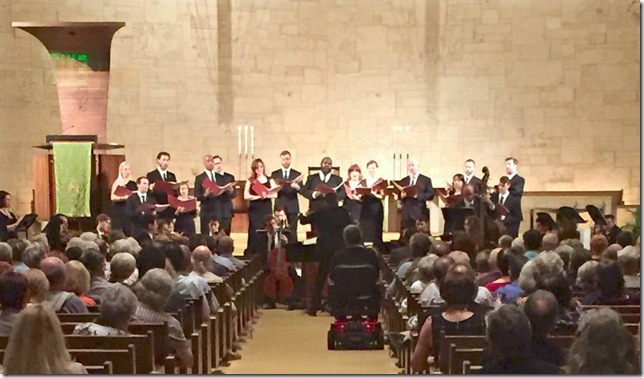This week, Seraphic Fire heads to the Northeast for concerts in Washington, New York and Philadelphia, joined by the period orchestra The Sebastians, and the choir no doubt wants to give the best impression it can.
If Saturday night’s concert at Miami Shores Presbyterian Church represents the quality of its calling card, audiences there will be delighted. For sheer technical accomplishment, it was one of the finest concerts this group has ever given, and it should make a spectacular impression on its East Coast auditors.
The all-Baroque program was built around three of the four Coronation Anthems of George Frideric Handel (Let They Hand Be Strengthened was left out), the Te Deum (in D, H. 146) of Marc-Antoine Charpentier, and the third act of Henry Purcell’s opera King Arthur. Seraphic Fire itself was augmented to 17 members from its usual 13, and the New York-based Sebastians were 21 strong, including three wind players (two oboe-recorder players and one bassoonist), a timpanist and three musicians playing natural valveless trumpets.
The orchestra, which includes some of the most accomplished young scholar-musicians in the country, was simply peerless. Even at the beginning of the Purcell, where conductor Patrick Dupré Quigley took things perhaps a pinch faster than the orchestra expected, the Sebastians adapted, instantly and expertly, without marring the proceedings in any way. And you can find on YouTube performances of the Charpentier work in which the natural trumpets are hit-and-miss. But the three trumpeters here, performing on what are more or less long bugles — Josh Cohen, Dennis Ferry and Timothy Will — were flawless: No missed notes, no splatters, and rock-solid intonation.
Atop this brilliantly accomplished Baroque ensemble was the choir itself, and it, too, was wonderful. This is where Quigley’s decision to establish his choir with the best singers he could find nationally rather than just locally paid off, because each section entrance had soloist-quality resonance and clarity. Joined with the Sebastians in the resonant acoustic at Miami Shores Presbyterian, the singers sounded like a vocal ensemble twice their size.
The three Handel anthems, beginning with The King Shall Rejoice in the first half, and Zadok the Priest and My Heart Is Inditing in the second half, were beautifully modulated by Quigley and his musicians, with the contrasting sections such as “Exceeding glad shall he be” in the The King Shall Rejoice and “King’s daughters were among thy honourable women” in My Heart Is Inditing coming off with a generous, confident ease (as well as welcome changes of key from a concert heavily in D major).
There was a laudable attention here to dynamics as well, with a well-planned and executed slow build in Zadok the Priest from the hushed arpeggios of the opening to the big entrance of the chorus. For My Heart Is Inditing, Quigley added as an ending the terminal “Amen” fugue from Handel’s Messiah, a good choice and a fine exclamation point on which to close the concert.
Charpentier’s Te Deum, written in the royal orbit of Louis XIV, is a marvelous work, not only for its blaze-of-glory majestics, but its solo and ensemble sections, whose vocal writing is far more ornamented and stylized than that of Handel. Countertenor Reginald Mobley and tenor Stephen Soph sang a lovely “Te per orbem terrarium,” and bass James Bass, and sopranos Jolle Greenleaf and Molly Quinn rendered a tenderly pretty “Fiat misericordia tua.”
But what made the whole thing stand out was its thorough understanding of the French Baroque idiom. This was a Charpentier Te Deum that sounded natural and fluent. Not once did it sound labored or under academic supervision. It ebbed and flowed, clicked and purred like an elegant machine, illuminating its beseeching text with directness and humanity but at the same time sparing no sonic expense to bring out its regal splendor.
The Purcell King Arthur made a splendid contrast with the Handel and Charpentier while recognizably speaking a similar language (the choir performed the entire work in the 2010-11 season). The third act, with its famous “What power art thou,” makes a terrific selection on its own thanks to its winning comedy, which the modest house at Miami Shores Presbyterian thoroughly enjoyed.
Greenleaf made a fine Cupid, whose top register had a round purity that fit the mythical nature of her Cupid, and Bass was a wonderful Cold Genius, not overdoing his celebrated aria of teeth-chattering tone painting, but giving it out with a strong, bronze-like voice and enough facial acting to make his interpretation thoroughly charming. The chorus sang winningly, especially in the final “’Tis love that has warmed us,” which was rich and redolent of good will.
Seraphic Fire has begun to add more runouts from its home in South Florida over the past couple years, and this Northeast residency marks an important step for the group, elevating its national profile. And they will raise the profile of this region of the country as well, reminding audiences elsewhere that South Florida is a strong arts area, which in the long run will boost its economic draw.
In the videos for this season, and in his remarks Saturday night, Quigley sounded much more rehearsed than he usually does, and it’s a pity to lose some of that casual warmth that has endeared him to his audiences. But the stakes are high this season, and everything must be just-so in order for the group to reach its 15th season in a mightier position.
What he has accomplished in bringing this group to this level is enormously impressive, and South Florida is in his debt for making such an important difference in this area’s arts scene. One can’t help but see him and the choir off this week with anything but the best wishes.
Seraphic Fire performs this program Tuesday night at St. Paul’s Parish in Washington; Wednesday night at Trinity Church on Wall Street in New York; and Thursday night at St. Clement’s Episcopal in Philadelphia. For more information, call 305-285-9060 or visit www.seraphicfire.org.

